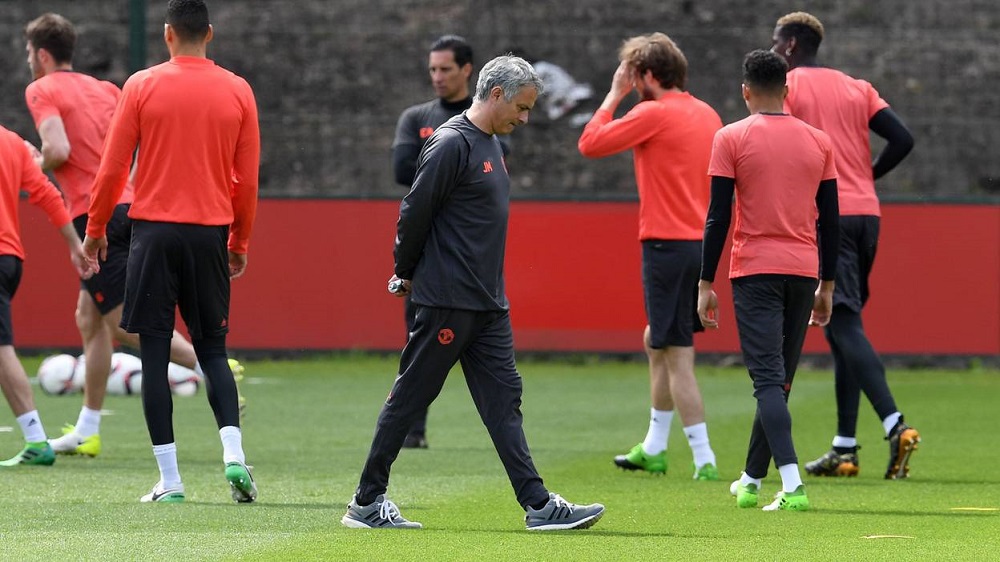London – Here’s a semi-interesting football stat, at a time when semi-interesting football stats are in short supply. If Manchester United were to win an unlikely Premier League and Champions League double next season they would, all things being equal, become the tallest team ever to win either competition.
A roughed out United first XI has them at an average height of close to 6ft 2in. Chelsea’s most recent English champions were just over 6ft. Leicester were relative titches at 5ft 11in. Only two Champions League-winning teams have struggled up to 6ft a head, Chelsea’s lofty outliers in 2012 and Jupp Heynckes’ hulking Bayern Munich a year later. There is no particular reason to suggest Mourinho’s United are about to join these teams. But if they do it will be a triumph of uniquely burly, gnarled, gangling proportions.
Perhaps this isn’t surprising. It’s no secret José Mourinho loves a big man. In managerial middle-age it seems an increasingly chronic obsession, Mourinho surrounding himself with gristle and muscle in the way a decrepit Pharaonic emperor king might surround himself with camels, asses, embroidered rugs, handsome thick-necked slave boys. Right now Mourinho is just a signing or two away from being able to field an entire first team in which every player is over 6ft tall, surely a first in any major league. Give him the tools. He will build a wall.
For Mourinho, the transfer window has at least been brutally to the point. To date he’s signed one very big man. He might still sign some others. Most intriguingly Eric Dier has again been linked with a move to Old Trafford, something that still seems unlikely from the outside, but which from a neutral perspective might just make some sense for all concerned.
Spurs won’t want to sell. But £50m is a lot of money for a player who isn’t always first choice. Plus it might be good for Dier, who has clearly learned a huge amount from Mauricio Pochettino, showing himself to be that rare thing, a powerful, imposing English footballer whose chief gifts are intelligence and tactical discipline, an ability simply to occupy a position, rumbling about the place like a Panzer tank on a leisurely mopping-up expedition.
It is quite a limiting role though, a question of following, repeatedly, a set of minutely grooved positional instructions. At the same time just imagine what nasty, sly, spoiling, winning habits a player of his unfussy intelligence could pick up from Mourinho, who hoards and covets defensive midfielders; who sees the hulking – Dier is 6ft 2in – defensive midfielder as the building block of all sporting life, the football equivalent of carbon; who gave Casemiro his Real Madrid debut; who took Thiago Motta from Genoa and made him a Champions League winner; and who transformed Mikel John Obi from attacking tyro to the world’s most improbably long-serving defensive wardrobe.
Most of all Dier to United would obviously be good for Mourinho, another peg in that increasingly rugged-looking second-season team. This has tended to be the José way. His great Chelsea Mk1 team were notably tough. Inter’s Champions League winners were a gnarled, high-energy bunch. Even the second Chelsea team, the Rat Pack team of Fàbregas-Hazard-Costa, were the tallest in the league on the opening weekend of their title-winning season.
Perhaps the most interesting thing here is that Mourinho really is out on his own on this one. Look back and the general trend is fairly static. Elite-level players aren’t getting noticeably taller. The first Premier League-winning team had an average height of 5ft 11in, pretty much the same as the last three. The last four Champions League winners have all been less than 6ft man for man.
It is only really Mourinho out there trying to block out the sky, a manager who these days basically only signs tall people. To date his major first-team buys at United have been Romelu Lukaku (6ft 3in) Zlatan Ibrahimovic (6ft 5in), Paul Pogba (6ft 3in), Victor Lindelof (6ft 2in) and Henrikh Mkhitaryan (5ft 11in). He doesn’t seem to trust Mkhitaryan much. Probably coincidence.
What he hopes to gain from this isn’t immediately obvious. Tallness doesn’t always equal toughness. The first great Alex Ferguson team of 1993-94 were relatively small, but still a thrillingly unforgiving bunch, all wild eyes, tiny shorts and huge crunching ankles. It is more a tactical thing with Mourinho. Quite lot of the game-plan these days seems to be about reducing the play to a series of static moves, winning individual challenges, disrupting an opponent’s supply lines. Height and power, the ability to affect “rapid aerial transitions”, to dominate set pieces – all of these clearly help.
This is just talk for now. Dier probably won’t leave Spurs. Mourinho might build his annihilating title march around the hobbit-like craft of Juan Mata, a footballer who even in the dying minutes of some frantic Premier League epic looks as though he’s about to sit down on a toadstool, tap his pipe on his shoe and start telling you a story. Like so many noises off in the dead days of mid-summer the dream of the all 6ft-plus XI is still just a tantalizing prospect.
It might not be the worst thing, though. For all the talk of verve United have often been a hard-running, tough-tackling team. This is part of the appeal, a history of ball-players but also of physical strength, from the dreamy promise of Duncan Edwards, to the horrible specimens of the mid-1980s, to Eric Cantona’s flair and muscle.
The question of what Manchester United are supposed to look like, how those red shapes should move, should look to win, has been constantly debated over the last few years. The yearning for more muscle and more power might look like a managerial tic, the opposite of dreamy, flee-flowing flair. But it isn’t so far away from the old winning swagger.
The Guardian Sport
